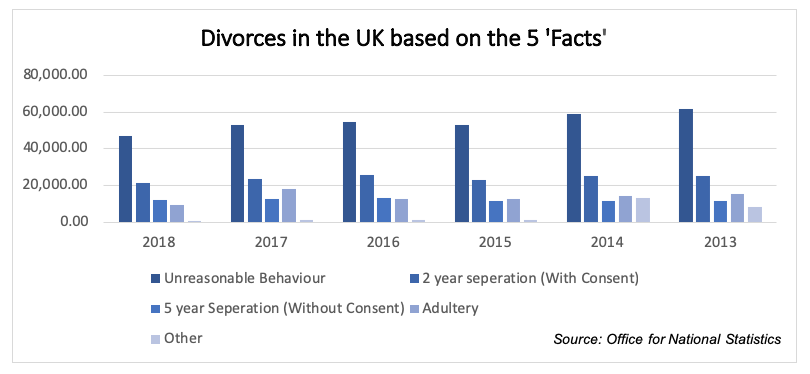On 9 April 2019, it was announced that the government will be implementing the Divorce, Dissolution and Separation Act 2020. This new law, which has received Royal assent and is expected to come into force in late 2021, will fundamentally reform the current divorce process with the removal of the concept of ‘fault’. This means that divorcing couples will no longer have to blame one another for the breakdown of their marriage or civil partnership. This will be the biggest change to divorce law in England and Wales in nearly 50 years.
What is the current law?
There is only one ground for divorce in England and Wales: that the marriage or civil partnership has “broken down irretrievably”. To demonstrate this, a person must establish one of the following five ‘facts of divorce’:
- Adultery: One spouse has had sexual intercourse with a member of the opposite sex, and the other finds it intolerable to live with them.
- Unreasonable Behaviour: One spouse has behaved in such a way that the other cannot reasonably be expected to live with them.
- Two years’ separation with consent: There has been a continuous two-year period of living apart after the petition has been presented and the parties consent.
- Five years’ separation without consent: There has been a continuous five-year period of living apart after the petition has been presented, irrespective of whether the parties consent.
- Desertion: One spouse intentionally leaves the other without good cause and without the other’s consent, for a period of at least two years.
Why the need for change?
The current law governing divorce presents a number of problems:
- The facts based on separation (two years with consent or five years without consent) are relatively straightforward to prove, but waiting can be emotionally draining and financially impractical. This encourages parties to opt for one of the facts of divorce based on fault, to achieve a quicker divorce. Parties most often opt for unreasonable behaviour, as can be seen from Table 1 below.
- The facts based on fault by one party (adultery, unreasonable behaviour and desertion) incentivise the parties to litigate in an accusatory and hostile manner. This can be particularly damaging where children are involved.
- Same-sex couples cannot rely on the fact of ‘Adultery’ as the definition is limited to “a person of the opposite sex”.

What is the new law?
A person wanting a divorce will still need to establish the single ground for divorce: that the marriage or civil partnership has “broken down irretrievably”. The key change is that they will not have to rely on the five facts of divorce. Instead, a spouse/civil partner or couple can apply for a divorce by simply making a statement of “irretrievable breakdown”.
Crucially, the option to contest the divorce has been removed. This further provides certainty in the divorce process. However, petitions can still be challenged on the jurisdictional or procedural grounds or on the basis of fraud, coercion or legal validity of the marriage/civil partnership.
Additionally, couples have the option of making a joint application. This recognises, for the first time, the wishes of both parties.
There are also changes to time frames. Under the current law, there is a period of reflection of six weeks and one day between the pronouncement of decree nisi and ability to apply for decree absolute. There will now be a ‘six month cooling off period’ between the petition and the decree absolute. In its consultation paper, the Ministry explained that this “would allow a sufficient period for most couples to consider the implications of divorce… while not being so long a period of uncertainty that it would have a long-term effect on children[1]”.
We have provided a table setting out the key changes below.
| QUESTIONS | CURRENT LAW Matrimonial Causes Act 1973. |
NEW LAW Divorce, Dissolution and Separation Act 2020 |
|---|---|---|
| What are the grounds for divorce? | The marriage or civil partnership has “broken down irretrievably” [2] | The marriage or civil partnership has “broken down irretrievably” |
| How do you prove this? | Must prove one of the five ‘facts’ of divorce:
|
No need to establish any of the five ‘facts’ of divorce
|
| Are there any other requirements or restrictions? | Must be married for at least one year before you can apply for a divorce
Minimum ‘reflection period’ of six weeks and one day |
Must be married for at least one year before you can apply for a divorce
Minimum ‘cooling off’ period of 20 weeks between the start of proceedings and decree nisi plus 6 weeks from decree nisi to decree absolute |
| Other points to bear in mind? | Ability to contest the divorce | No ability to contest the divorce |
Further information
If you need some advice about divorce, contact our matrimonial specialists Holly Berner hb@woodfords.co.uk.


